Introduction
In the journey to overcome substance use disorders, routine plays a vital role in shaping a new, healthier lifestyle. Establishing a structured routine offers not only a framework for stability but also fosters emotional and physical well-being, key components in the recovery process. This article delves into the importance of routine as a cornerstone of recovery, offering insights and strategies to build a robust recovery plan.
The Foundation of Routine in Recovery
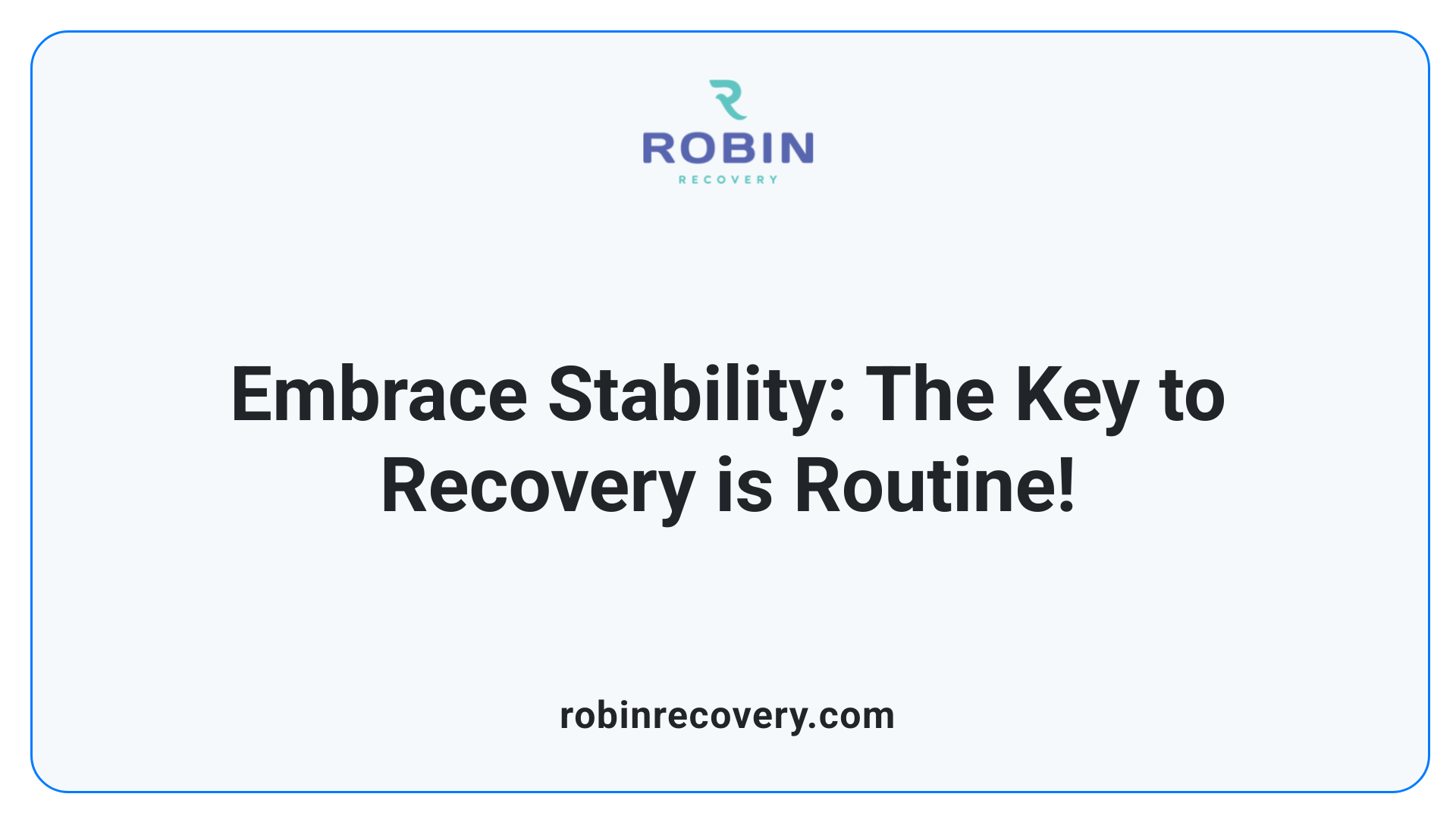
Why is it important to have a plan in recovery?
Having a plan in recovery is crucial because it provides structure and routine, which are essential for stability and developing self-control in the face of temptations. A well-thought-out plan allows individuals to establish a 'new normal' by replacing harmful habits with healthier practices and helps in forming these new habits over time.
Maintaining a routine can combat boredom, a common trigger for relapse, by keeping individuals engaged in positive activities. For instance, activities such as regular exercise not only improve physical health but also enhance mood and reduce stress levels, making it easier to resist cravings.
Furthermore, a solid recovery plan fosters self-esteem and reinforces the ability to navigate challenges. Individuals who incorporate daily meditation or mindfulness exercises into their routines often find that these practices help manage stress and anxiety, which are critical for long-term sobriety.
Building Stability Through Routine
Establishing a consistent daily routine brings about a sense of predictability. This stability helps alleviate feelings of chaos that often accompany the recovery journey. Moreover, daily accomplishments, even small ones, contribute to enhanced self-esteem, reinforcing the sense of purpose essential for recovery.
Cultivating Self-Control
Self-control plays a key role in resisting the temptations associated with addiction. Like building muscle, willpower can be strengthened through consistent healthy habits integrated into a daily routine. By engaging in activities that require effort and perseverance, individuals can achieve 'hard-earned dopamine,' leading to lasting satisfaction compared to fleeting pleasures.
Forming Healthy Habits
Incorporating more positive habits into recovery routines—such as nutritious eating, regular exercise, and social interactions—greatly supports both physical and emotional well-being. These proactive choices can reinforce a sense of accountability and community, essential elements for sustained recovery success. Through ongoing participation in support groups and therapy sessions, individuals can build essential networks that further bolster their commitment to sobriety.
Effective Strategies for Routine Maintenance
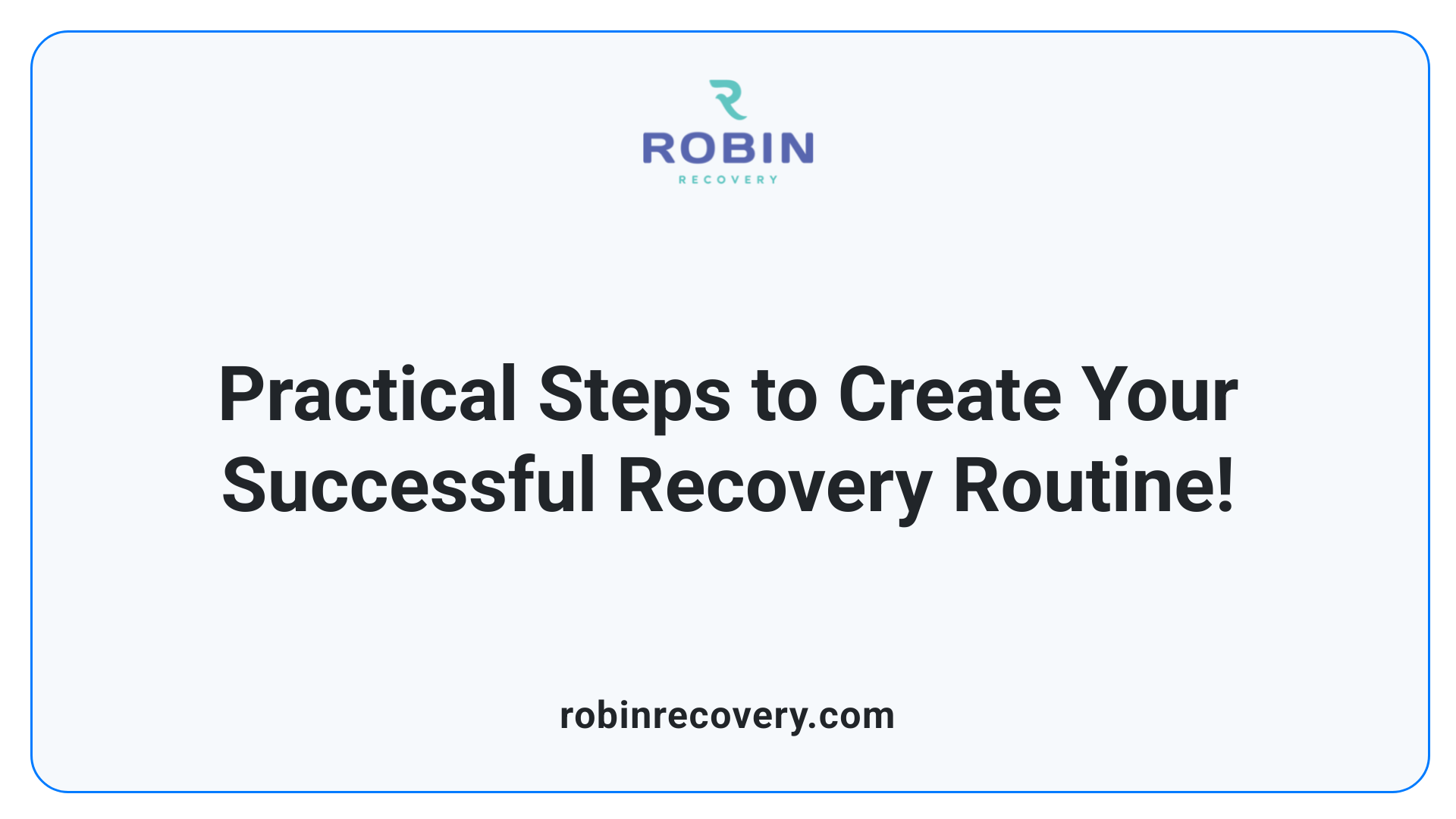
What are practical strategies for creating and maintaining routines to support recovery?
Creating and maintaining a routine during recovery is essential for supporting long-term sobriety. Here are some effective strategies:
Personalized Morning Routine: Start the day with activities that set a positive tone, such as light exercise, meditation, or journaling. This fosters a sense of accomplishment right from the beginning.
Structured Schedule: Establish a daily schedule that includes consistent sleep patterns. Having regular bedtimes helps regulate circadian rhythms, improving sleep quality and reducing stress.
Nutritious Meals: Plan meals ahead of time. Incorporating balanced meals filled with fruits, vegetables, and lean proteins can support physical health and emotional well-being.
Dedicated Time for Support Meetings: Regular participation in support groups or recovery meetings reinforces accountability and provides emotional support. Integrate these into your weekly schedule to maintain commitment.
Set Small, Attainable Goals: Begin by setting achievable daily or weekly goals. Completing these can build confidence and promote a sense of purpose.
Flexibility: Allow room for adaptability within your routine to accommodate life changes or unforeseen events, thus preventing feelings of overwhelm.
Engagement in Enjoyable Activities: Include hobbies or relaxing activities in your schedule to combat boredom and keep motivation high.
Learning from Others: Seek inspiration from those in similar journeys. Sharing experiences can provide new ideas and insights for sustaining routines.
Implementing these strategies helps establish a foundation for recovery, aiming for stability and fulfillment in daily life.
Understanding the Benefits of Routine
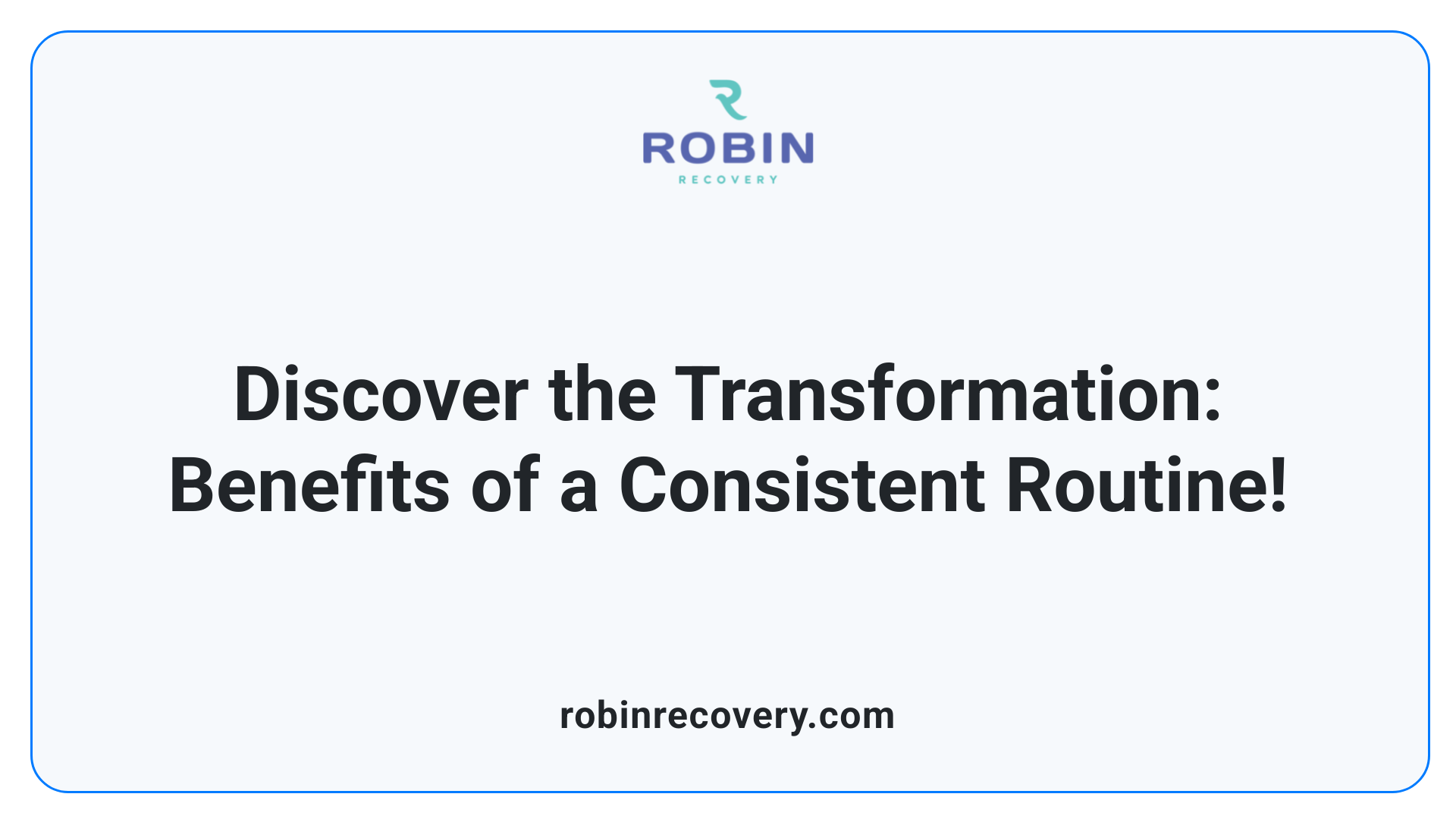
What are the benefits of establishing a routine in recovery from substance use disorders?
Establishing a routine in recovery from substance use disorders offers several significant benefits. It provides predictability and accountability, helping individuals transition from treatment to everyday life while reducing feelings of restlessness and boredom.
A consistent routine enhances stress management, which is vital as stress can lead to cravings and potential relapses. Engaging in structured activities fills idle time, minimizing triggers that might tempt individuals back to substance use.
Additionally, a well-planned daily routine promotes better sleep, nutrition, and exercise. Improved physical health positively correlates with mental well-being, thereby fostering resilience and stability in recovery. Here’s a brief summary of how routine supports these aspects:
| Benefit | Detail | Impact |
|---|---|---|
| Predictability | Provides structure to daily life | Reduces anxiety and uncertainty |
| Accountability | Helps track progress and maintain commitments | Encourages ongoing participation in therapy |
| Stress Management | Alleviates feelings of overwhelm | Minimizes triggers associated with idle time |
| Enhanced Self-Esteem | Completes daily tasks and goals | Boosts confidence and promotes a sense of purpose |
Ultimately, a well-structured daily routine supports recovery by reducing idle time and the risk of relapse while promoting a balanced and fulfilling life.
The Impact of Healthy Habits
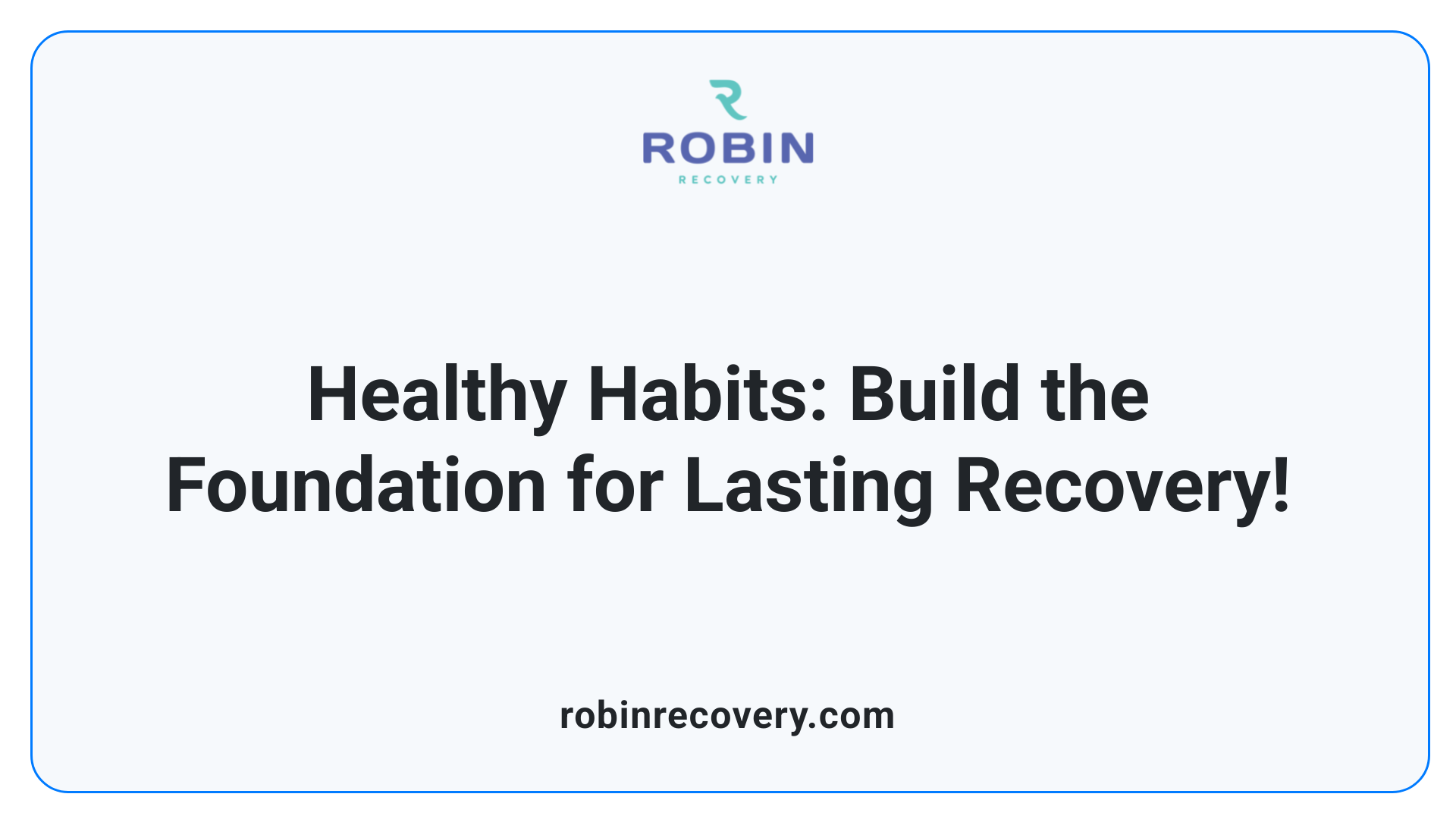
How can healthy habits like eating, sleeping, and exercising support addiction recovery?
Healthy habits such as proper nutrition, sufficient sleep, and regular physical activity are foundational in supporting addiction recovery. Establishing these routines allows individuals to replace harmful behaviors with healthier choices, ultimately reducing the risk of relapse.
Nutrition plays a crucial role. Eating balanced meals that include colorful fruits, vegetables, and lean proteins can significantly enhance physical health. These food choices help replenish essential nutrients that are often depleted due to substance use, supporting the body’s healing process. Nutritional stability also positively impacts mental health, enhancing mood and emotional balance.
A consistent sleep schedule is vital as quality sleep improves overall wellness. It helps regulate stress and anxiety, two common challenges in early recovery. Establishing a regular bedtime and sticking to it can mitigate insomnia, a frequent issue faced by those post-addiction. An improved sleep pattern can contribute to a clearer mind, aiding decision-making and emotional resilience.
Regular physical activity is equally important. Exercise not only boosts physical health but also releases endorphins that elevate mood, which can counteract negative feelings and cravings. Engaging in activities like walking, gardening, or group sports fosters a sense of purpose and accomplishment, becoming an essential coping mechanism against stress.
Incorporating these healthy habits into a daily routine cultivates self-discipline and structure. Each small success reinforces confidence and strengthens the commitment to long-term sobriety.
Psychological Benefits of Structured Routines
What are the psychological impacts of a structured routine in addiction recovery?
The psychological impacts of a structured routine in addiction recovery are significant and multifaceted. A routine provides essential stability and predictability, which helps individuals cope with withdrawal symptoms and manage cravings effectively.
Emotional Regulation
Structured routines foster emotional regulation as they create a safe framework for exploring feelings. Limited idle time reduces the chance of relapsing into old habits driven by boredom or anxiety. By engaging in daily tasks and positive activities, recovery becomes a more manageable process.
Stress Reduction
The predictability of a daily schedule significantly reduces stress levels. When individuals know what to expect, anxiety diminishes. Completing daily tasks fosters a sense of accomplishment that bolsters emotional well-being. Moreover, managing cortisol levels through activities scheduled in the morning can lead to better overall mood and resilience against stressors.
Mental Well-Being
Consistent routines are instrumental in improving mental well-being. They cultivate a sense of purpose, enhance self-esteem, and promote self-discipline, which not only helps in resisting temptations but also reinforces commitment to recovery.
By integrating therapy sessions, exercise, and social activities into the routine, individuals create a holistic approach to their mental health. The structure not only encourages consistent engagement in recovery activities but also enhances accountability through social support, providing a solid foundation for lasting change in their lives.
Contributing to Long-Term Sobriety
How do routines contribute to long-term wellness and sobriety?
Routines play a pivotal role in achieving long-term wellness and sobriety for individuals recovering from substance use disorders. By creating a structured environment, individuals can transition from the chaos of addiction to a more predictable lifestyle. This stability alleviates stress and anxiety, essential components in managing cravings and preventing relapse.
Establishing new habits is vital during recovery. Research indicates that it usually takes around 66 days for individuals to form these new habits. Consequently, a daily routine that includes consistent activities such as exercising, maintaining a balanced diet, and engaging in social interactions fosters accountability and promotes overall well-being.
Building a holistic approach in recovery is crucial. For instance, regular physical activity not only improves physical health but also releases endorphins, which boost mood and resilience against cravings. Furthermore, focusing on nourishing meals enriches nutritional intake, offering essential nutrients critical for healing the body.
Engagement in structured routines also helps manage stress effectively. Predictability through daily schedules minimizes feelings of boredom, a major relapse trigger. Activities can be planned to fill unoccupied time, thereby promoting a sense of purpose and accomplishment.
In summary, routines cultivate healthy habits while managing stress, ultimately fortifying long-term sobriety. They are the backbone of recovery, ensuring a steady progression toward achieving emotional and physical health.
The Three P's of Recovery
What are the three P's of recovery and why are they important?
The three P's of recovery—patience, persistence, and perseverance—are fundamental aspects of achieving sobriety and emotional stability. Each of these qualities plays a vital role in navigating the complex path of recovery from substance use disorder.
Patience
Patience is crucial in recovery as it encourages individuals to recognize that healing takes time. Acknowledging this gradual process helps foster self-forgiveness and reduces feelings of guilt associated with past behaviors.
Individuals learn to appreciate their progress, no matter how small, and develop a mindset geared towards long-term growth.
Persistence
In recovery, persistence acts as the driving force that propels individuals forward. It enables them to remain engaged in their recovery efforts, even when faced with obstacles or setbacks. This unwavering dedication is vital for building resilience and ensuring that the recovery journey continues despite challenges.
Perseverance
Perseverance is essential for tackling the difficulties encountered along the recovery path. It ensures that individuals commit to their health goals and maintain focus on their progress. By cultivating perseverance, people are better equipped to handle temptations and emotional struggles, ultimately reinforcing their commitment to a sober lifestyle.
In essence, the three P's of recovery create a robust framework, helping individuals embark on their journey towards lasting sobriety and personal growth.
Managing Downtime in Recovery
How can individuals manage downtime in recovery?
Individuals can manage downtime in recovery by proactively engaging in planned activities that provide both structure and enjoyment. Structured routines are vital as they combat boredom—a significant relapse trigger. Incorporating hobbies, exercise, or creative endeavors not only fills time but also enhances mental well-being, making the recovery process more fulfilling.
The Importance of Support Networks
Connecting with a support network during periods of downtime is crucial. Support groups, family, and friends can offer emotional balance, preventing feelings of isolation. Regular interactions help individuals stay accountable and motivated, reinforcing their commitment to sobriety.
Engaging Activities for Recovery
When it comes to filling idle time, choosing productive activities is essential. Here are a few suggestions to consider:
| Activity Type | Description | Benefits |
|---|---|---|
| Hobbies | Engage in activities like painting or gardening | Builds skills and satisfaction |
| Exercise | Involves walking, cycling, or yoga | Boosts mood through endorphin release |
| Social Activities | Join a support group or meet friends | Enhances connections and support |
| Volunteering | Help in community services or local charities | Fosters a sense of purpose |
| Mindfulness Practices | Daily meditation or yoga | Reduces stress and anxiety |
Utilizing Healthy Coping Strategies
Learning to recognize signs of stress and emotional fatigue can guide individuals on when to take breaks. Instead of reverting to substance use, implementing healthy coping mechanisms—like utilizing tools such as the Managing Downtime to Avoid Relapse CBT Worksheet—can identify triggers and encourage planning healthy distractions.
Continuous Reflection and Adaptation
Regularly evaluating the effectiveness of these activities is essential to adapt them to one's recovery journey. Staying engaged and active in a planned, structured way enhances motivation, supporting long-term recovery goals.
Overcoming Challenges in Maintaining a Routine
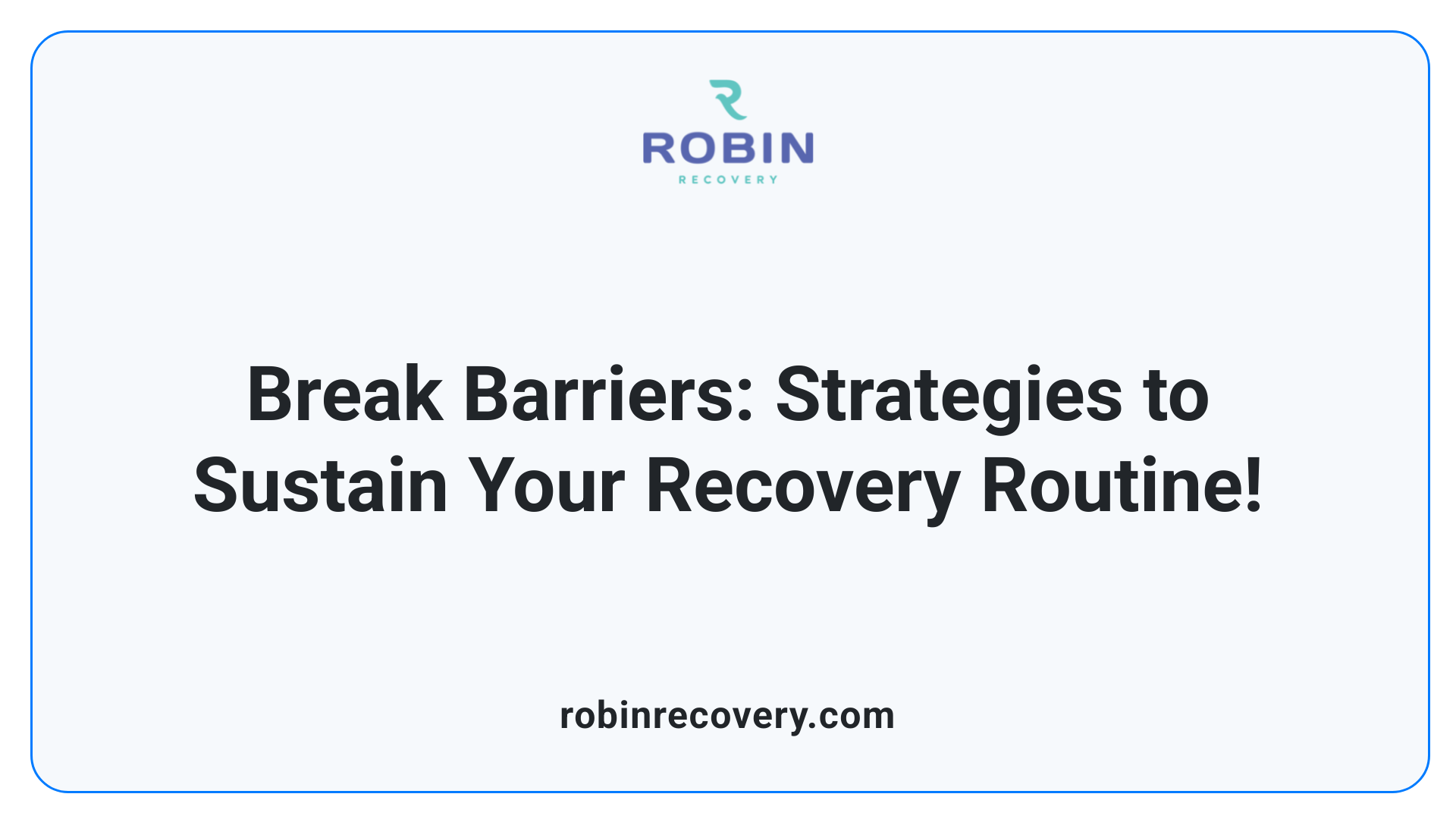
How to overcome challenges in maintaining a recovery routine?
Overcoming challenges in maintaining a recovery routine hinges on the importance of structure and support. One effective way to achieve this is by joining support groups, such as Alcoholics Anonymous (AA), which can provide a strong sense of community. These groups not only help individuals feel connected but also significantly reduce feelings of isolation that often accompany recovery.
Developing Coping Strategies
Alongside group support, developing new coping strategies is essential for managing stress and cravings. Mindfulness practices, such as meditation or deep breathing exercises, can be beneficial. Journaling is another great tool; it allows individuals to reflect on their thoughts and feelings, which can help prevent a build-up of negative emotions. Incorporating these practices into a daily routine reduces anxiety and enhances self-awareness.
Maintaining Motivation
Creating a flexible schedule that incorporates sleep, regular exercise, and enjoyable activities is key to preventing boredom. This kind of structure also fosters motivation, ensuring that individuals remain engaged in their recovery journey. Furthermore, building a supportive network and fostering open communication with family and friends can provide the necessary encouragement and accountability. Regular check-ins with loved ones can reinforce commitment and promote overall well-being.
| Strategy | Description | Expected Outcome |
|---|---|---|
| Join Support Groups | Engage with others on similar journeys for community and accountability | Reduced isolation and increased motivation |
| Mindfulness Practices | Regularly practice meditation and journaling to manage stress | Enhanced focus and reduced anxiety |
| Flexible Schedule | Incorporate self-care and enjoyable activities into daily routines | Greater engagement and satisfaction |
In summary, maintaining a structured routine during recovery is essential, and overcoming challenges requires both support and the implementation of effective coping strategies.
Conclusion
The journey of recovery demands inner strength and a well-structured plan. Developing and maintaining a routine provides the essential building blocks for this journey, offering stability and a path towards healthier living. By integrating elements of physical health, emotional balance, and social support, individuals can create routines that not only foster long-term sobriety but also personal growth and well-being. The routine is not merely a schedule; it is the framework within which recovery flourishes.
References
- Why Structure and Routine Are Important in Recovery
- SFAS Prep - Lifestyle Habits For Recovery Pt. 3 - Terminator Training
- Daily Routines in Recovery - Ashley Addiction Treatment
- The Importance of Routine in Recovery: How Habits Help You Stay ...
- Three Part Recovery Plan: Eat, Sleep, and Exercise
- The Power of Routine in Your Alcohol Recovery Journey - Bold Health
- The Importance of Routine in Substance Use Recovery
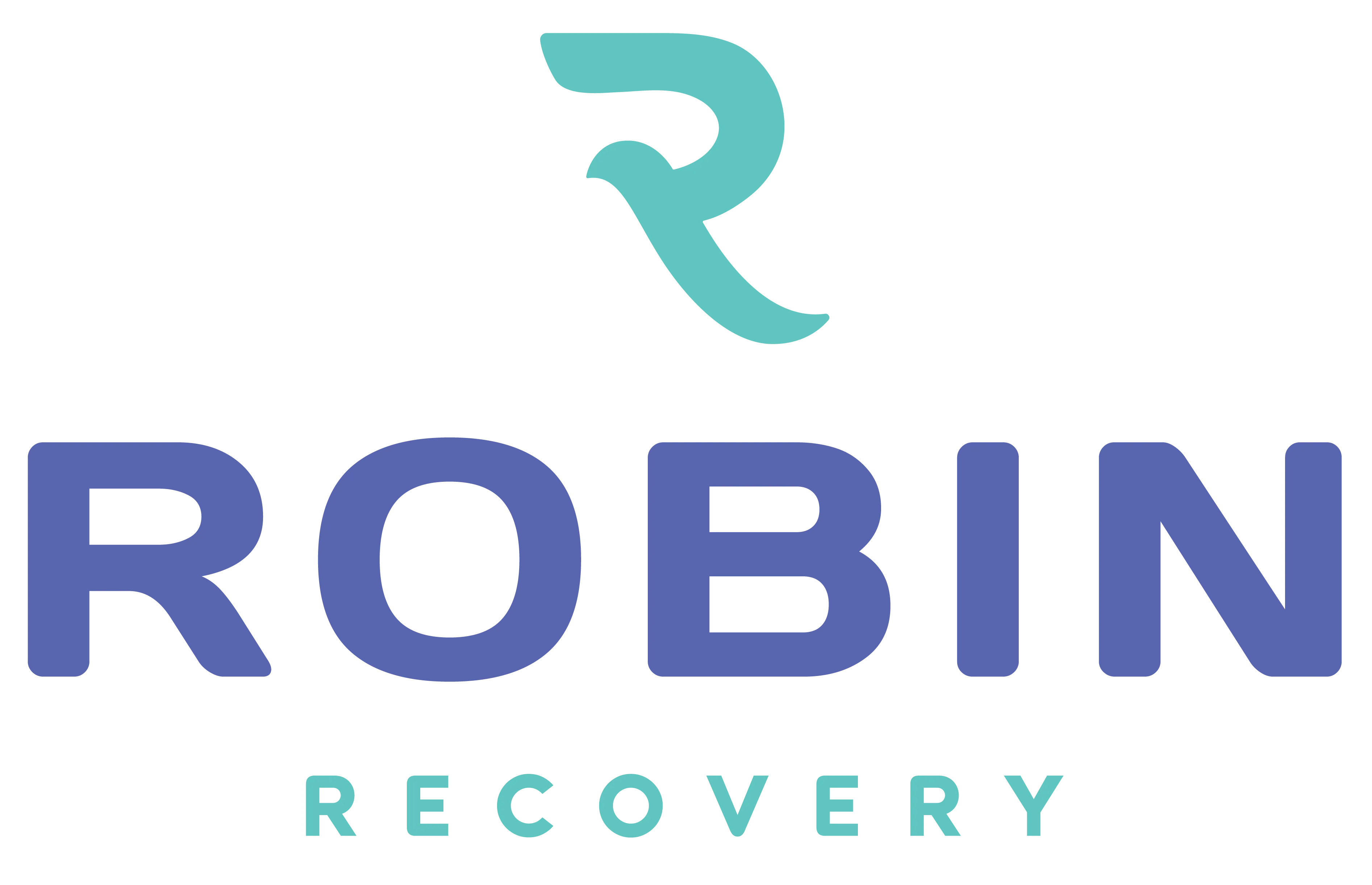
.svg)

.svg)

.svg)
.svg)






































































































